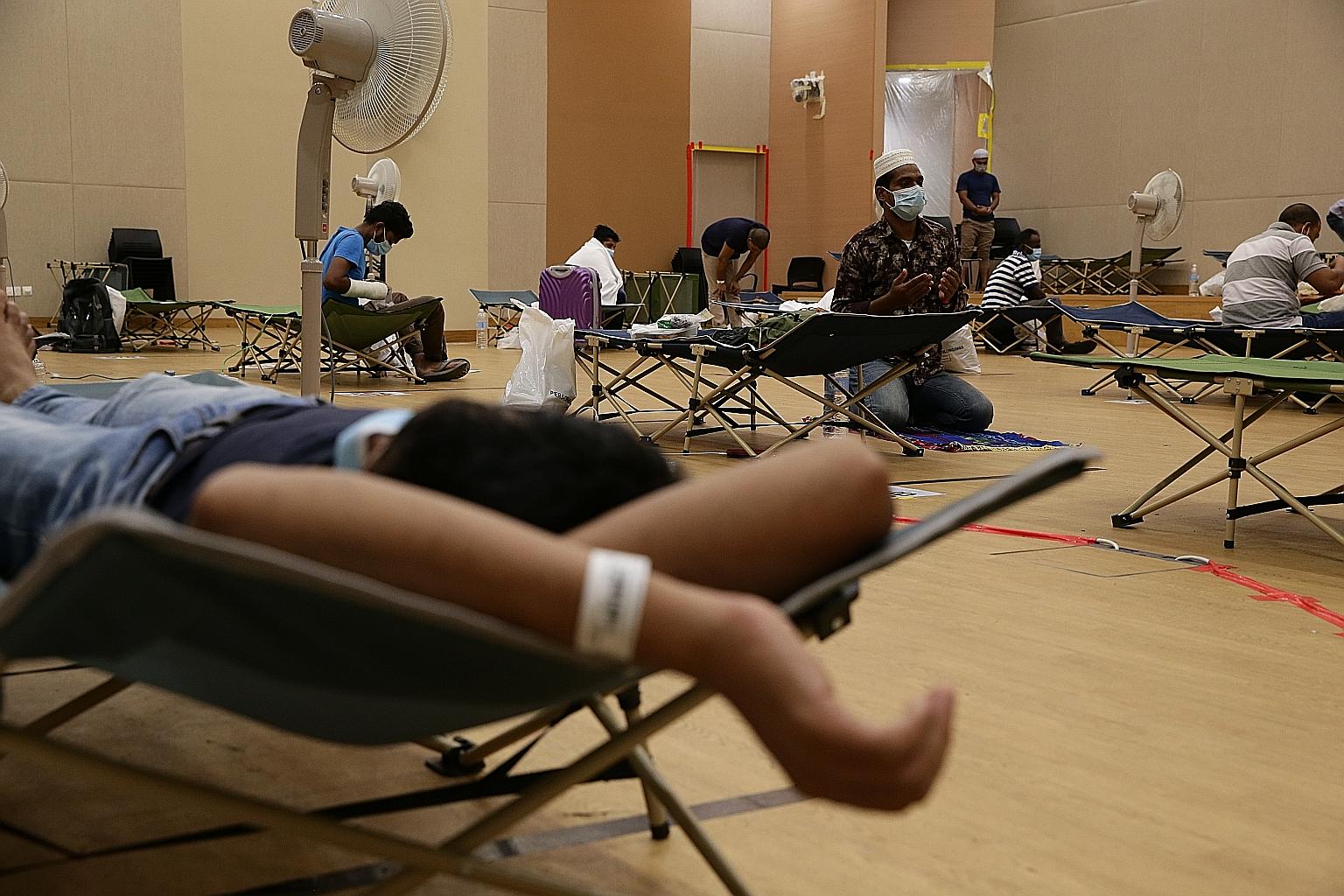Coronavirus Reinfections
Reinfection possible as immunity wanes over time: Experts
But this is hard to predict as antibody levels and their longevity vary from case to case
Sign up now: Get ST's newsletters delivered to your inbox

A photo taken in April last year of Covid-19 patients at Ng Teng Fong General Hospital. On Saturday, Singapore reported its first known case of Covid-19 reinfection, a 28-year-old male Bangladeshi national who was diagnosed for the first time on April 12 last year. He was isolated on Jan 25 after his test came back positive.
ST PHOTO: KEVIN LIM
Timothy Goh, Audrey Tan
Follow topic:
People who have recovered from Covid-19 can get reinfected as the immunity they have gained against the virus wanes over time, say experts.
But how this pans out with each person is difficult to predict as antibody levels and their longevity vary from person to person, they told The Straits Times yesterday in response to the first case of Covid-19 reinfection detected in Singapore.
Professor Teo Yik Ying, dean of the National University of Singapore's (NUS) Saw Swee Hock School of Public Health, said people who have been infected typically mount a neutralising antibody response for a period of time that protects against reinfection.
Neutralising antibodies are so called because they bind to specific, important sites of the virus and prevent it from infecting a human cell.
"However, this immune response has been shown to wane with time, and the previous reports of reinfections in South Korea, Hong Kong and other parts of the world typically happen after three months of the first infection," noted Prof Teo.
On Saturday, Singapore reported its first known case of reinfection, a 28-year-old male Bangladeshi national who was diagnosed for the first time on April 12 last year. He had consistently tested negative for the infection since last June. But on Jan 25, he was isolated after his test came back positive. Numerous repeat tests were also positive.
Professor Wang Linfa from Duke-NUS Medical School, who developed the neutralising antibody test kit cPass, which was the first of its kind to obtain approval from the United States Food and Drug Administration, said his team had found that infected individuals can register very different neutralising antibody responses.
Antibody longevity also varies greatly, he added. "So it is possible to have prior infection with no or very low neutralising antibodies," he said.
Dr Shawn Vasoo, clinical director of the National Centre for Infectious Diseases, said data has shown that immunity from natural infection can last at least six months, perhaps longer.
While this immunity is conferred by the neutralising antibodies the body makes after infection, they are just one element of the human immune system, he said.
-
Reinfection not due to new strains
The Covid-19 reinfection of a 28-year-old male Bangladeshi national is due to currently circulating strains of the virus in the region, not the new ones said to be more contagious, based on investigations, said Dr Shawn Vasoo, clinical director of the National Centre for Infectious Diseases.
Professor Teo Yik Ying, dean of the National University of Singapore's Saw Swee Hock School of Public Health, said there have been reports of reinfections overseas, but these are still generally rare.
"But with more than 105 million cases worldwide, even rare events are starting to add up to give quite large numbers," he said, noting genetically proven reinfections in South Korea and Hong Kong, where the first and second infections were caused by genetically distinct viruses. People can get reinfected regardless of strain type, he added.
Audrey Tan, Timothy Goh
Another element, cellular immunity, arises from special immune cells called lymphocytes. These cells recognise Sars-CoV-2, as the virus causing Covid-19 is called, and prevent it from reinvading cells.
Dr Vasoo said people who are immuno-suppressed - such as patients taking medications which depress their immune system - or people who had only a mild first infection may have a shorter-lasting immunity.
But experts said knowledge about the coronavirus, and how the immune system responds to it, is an evolving area. This coronavirus had been unknown before it first surfaced in China over a year ago.
Professor Dale Fisher from the department of medicine at the NUS Yong Loo Lin School of Medicine said: "We don't know how completely and how long the immunity after infection lasts. We have seen dozens of proven reinfections globally and many more suspected, but it remains very rare. We do not know if it will become less rare as time progresses."
Associate Professor Alex Cook from the Saw Swee Hock School of Public Health noted as well that the presence of antibodies does not guarantee the body will fight off an infection.
People should follow the current safe management measures to prevent reinfections, the experts advised.
"People who have been infected may wish to continue to take the regular precautions such as frequent hand washing that the rest of us do," said Prof Cook, who is the vice-dean of research and domain leader for biostatistics and modelling at the school.
However, the risk of infection for the public is still low because of the country's safe management measures and low community transmission, he said.
Prof Fisher, who is also a senior consultant at the division of infectious diseases at the National University Hospital, and chair of the World Health Organisation's Global Outbreak Alert and Response Network, said: "Until we have more answers, people should continue to follow the same rules of distancing, mask wearing and not being a part of large gatherings.
"It's another reason why we have still recommended vaccination, even if someone has been infected before."
Dr Vasoo said this reported case of reinfection, as with the other reported cases in the world, will not substantially change the core strategy to contain Covid-19 in Singapore, which primarily involves prevention by safe distancing, mask wearing, vaccination, and early detection and isolation via testing.
"We will need to continue to be vigilant," he added.

